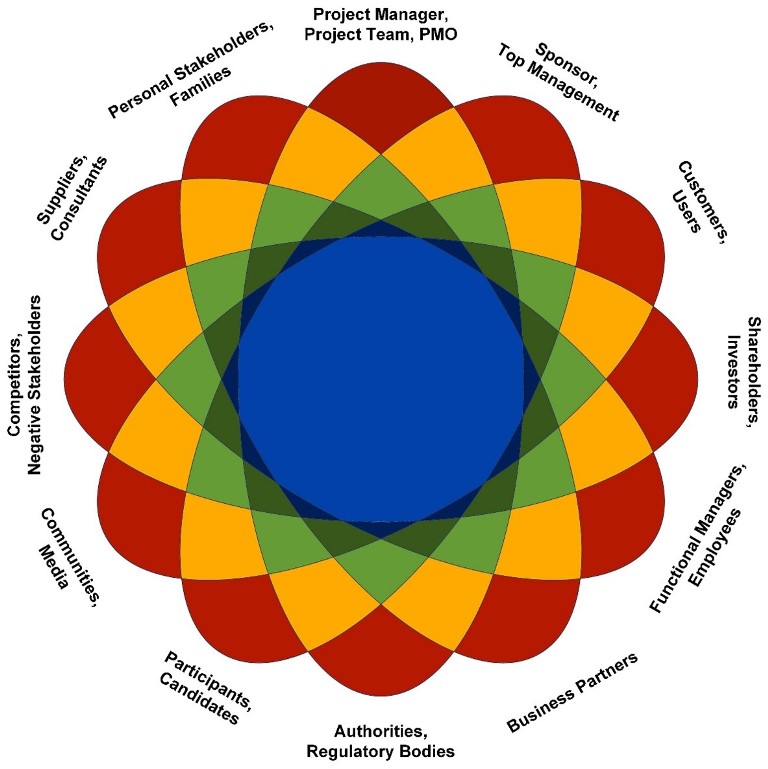a critical challenge
FEATURED PAPER
By Massimo Pirozzi
Rome, Italy
ABSTRACT
In each project, the centrality of the stakeholders remains a fully valid principle also in the cases of negative and neutral stakeholders, the behaviors of whom tend to influence negatively – either directly or indirectly, either deliberately or not, but always with consequent heavy impacts on project performances – the delivered value, and, ultimately, the success rate of the project itself. Therefore, an appropriate identification of both evident and potential stakeholders that are or might be characterized by a negative or neutral behavior becomes essential, as well as an effective relationship management turns out to be a critical success factor also in these peculiar stakeholder cases. This paper deepens the domains of the negative and neutral stakeholders, outlines the impacts of the stakeholder behaviors on the project value, shows the guidelines for the effective stakeholder identification and relationship management, and focuses on the specific guidelines that are successfully applicable in the cases of the negative and neutral stakeholder engagements – and eventual disengagements.
NEGATIVE AND NEUTRAL STAKEHOLDERS, WHO ARE THEY?
The concept of stakeholder incorporates several key words and issues. In fact, a project stakeholder is a person, or a group of persons, or an organization, who (Pirozzi, 2019):
- participates, or would like to participate, in the project;
- has some kind of interest in the project;
- can be (if properly engaged) a foundational supporter of the project;
- may affect/influence the project, or may be affected/influenced by the project, or may perceive to be affected by the project itself;
- can bring a value, which could be either positive or negative, to the project;
- may have responsibilities – that involve ethics – towards the project, which, in turn, is supposed to satisfy his requirements and expectations;
- is characterized by a risk based thinking approach;
- is part of a set that characterizes uniquely each project;
- has a central role in all projects: stakeholders, indeed, both implement the project and determine its success via their satisfaction, and, then, are the actual key for project success.
Therefore, there are several diverse typologies of project stakeholders (Fig.1), who interact each other via their behaviors. Although we generally tend to consider – and unfortunately quite often to assume – that all stakeholders have positive attitudes and behaviors towards the project – so requiring correspondent positive “engagement” efforts in order to obtain their support – in the real world this regrettably almost never happens. In fact, the stakeholder behaviors can be either positive, or negative, or neutral, and, in addition, may change in the different moments of the project lifecycle. Since the negative and neutral behaviors bring, or tend to bring, a negative value, the impacts on the projects are evident, and may be of basic importance; however, both above stakeholder categories and the management of relations with/among them have been almost ignored in the project management literature for decades.

Fig.1 – An example of stakeholder rose (Source: Pirozzi, 2019)
In general, the negative stakeholders are negatively engaged in the project, i.e. their behaviors bring to the project – due to a large variety of possible reasons – a value that is lower than expected or negative at all. The sole evident typology of negative stakeholders is the domain of competitors, while, in almost all the other cases, the negative behaviors can unfortunately be detected – at least for the first time – only retrospectively, i.e. once they came forward, and this make the issue of their management further complex. In principle, in fact, all stakeholders may be considered “potentially negative”, because they can be and/or become negative based on their behaviors, which in any case may be evolutionary in the project lifecycle. In other words, the project stakeholders potentially behave as the unrevealed stakeholders and the two-timing stakeholders in IT security: both act as “normal”, basically positive stakeholders until they can, suddenly and/or unexpectedly, turn out to be negative.
On the other hand, the neutral stakeholders are reluctant to be engaged in the project, e.g. they try to avoid formalizing their agreements/comments/signatures, and their behavior, although is apparently neutral with no added value, turns out to bring to the project a value that is lower than expected or negative at all, as in the case of negative stakeholders. In fact, the behaviors of the neutral stakeholders always cause delays –and then additional costs – and may also generate misunderstandings and/or inaccurate definitions relevant to the scope, as for instance happens when the customers are reluctant to specify their requirements and/or to explicit their expectations.
More…
To read entire paper, click here
How to cite this paper: Pirozzi, M (2023). Effectively managing negative and neutral stakeholders: a critical challenge; PM World Journal, Vol. XII, Issue II, February. Available online at https://pmworldlibrary.net/wp-content/uploads/2023/02/pmwj126-Feb2023-Pirozzi-effectively-managing-negative-and-neutral-stakeholders.pdf
About the Author

Massimo Pirozzi
Rome, Italy
![]()
Massimo Pirozzi, MSc cum laude, Electronic Engineering, University of Rome “La Sapienza”, Project, Program and Portfolio Manager, Principal Consultant and Educator. He is a Member of the Executive Board and an Accredited Master Teacher, of the Istituto Italiano di Project Management (Italian Institute of Project Management). He is certified as a Professional Project Manager, as an Information Security Management Systems Lead Auditor, and as an International Mediator. He is a Researcher, a Lecturer, and an Author about Stakeholder Management, Relationship Management, and Complex Projects Management, and his papers have been published in U.S.A., in Italy, and also in Russia; in particular, he is the Author of the innovative Book “The Stakeholder Perspective: Relationship Management to enhance Project value and Success”, CRC Press, Taylor & Francis Group, Boca Raton (FL), U.S.A., October 2019. Due to the acknowledgement of his comments on stakeholder-related issues contained in Exposure Draft of The Standard for Project Management – 7th Edition, he has been recognized as one of the Contributors and Reviewers of The PMBOK® Guide – Seventh Edition, and he received the Certificate of Appreciation for Excellence for his volunteer contributions to the Project Management Institute and the project management profession in 2020.
Massimo Pirozzi has a wide experience in managing large and complex projects, programs, and portfolios in national and international contexts, and in managing business relations with public and private organizations, including multinational companies, small and medium-sized enterprises, research institutes, and non-profit organizations. He worked successfully in several sectors, including Defense, Security, Health, Education, Engineering, Logistics, Cultural Heritage, Transport, Gaming, Services to Citizens, Consulting, and Web. He was also, for many years, a Top Manager in ICT Industry, and an Adjunct Professor in Organizational Psychology. He is registered as an Expert both of the European Commission, and of Italian Public Administrations.
Massimo Pirozzi is an Accomplished Author and an International Editorial Advisor of PM World Journal. He received three 2020 PM World Journal Editor’s Choice Awards for his featured paper “Project Management for Evidence Based Medicine” (co-authored with Dr. Lidia Strigari), for his Article “Project communications 1.0 and 2.0: from information to interactivity” and for his report from Italy titled “The fight against Coronavirus disease (COVID-19) from the perspectives of projects and of project management”. He received also two 2019 PM World Journal Editor’s Choice Awards for his featured paper “Stakeholders, Who Are They?”, and for his report from Italy titled “PM Expo® and PM Maturity Model ISIPM-Prado®”, and a 2018 PM World Journal Editor’s Choice Award for his featured paper “The Stakeholder Management Perspective to Increase the Success Rate of Complex Projects”.
Massimo can be contacted at max.pirozzi@gmail.com.









